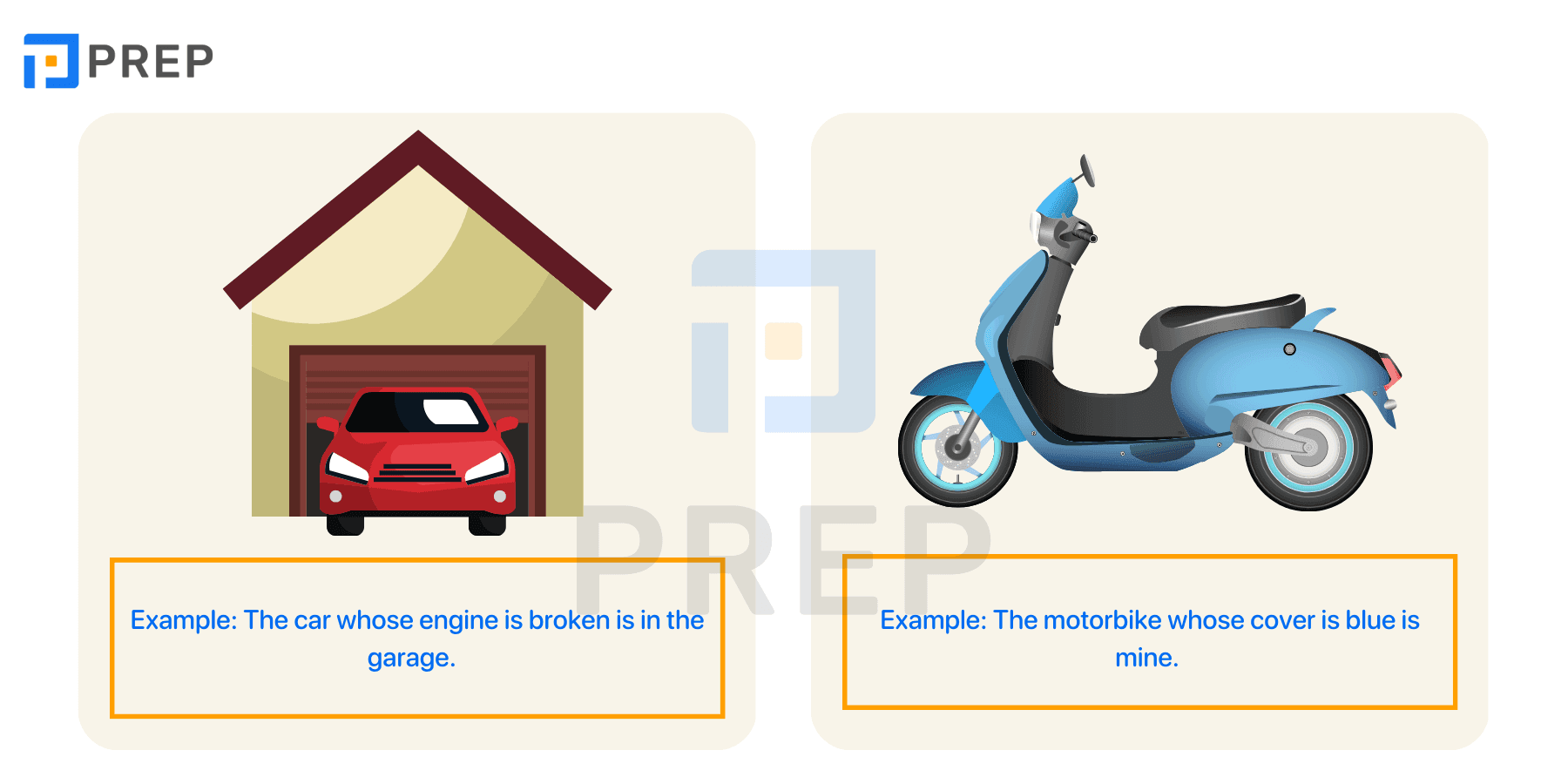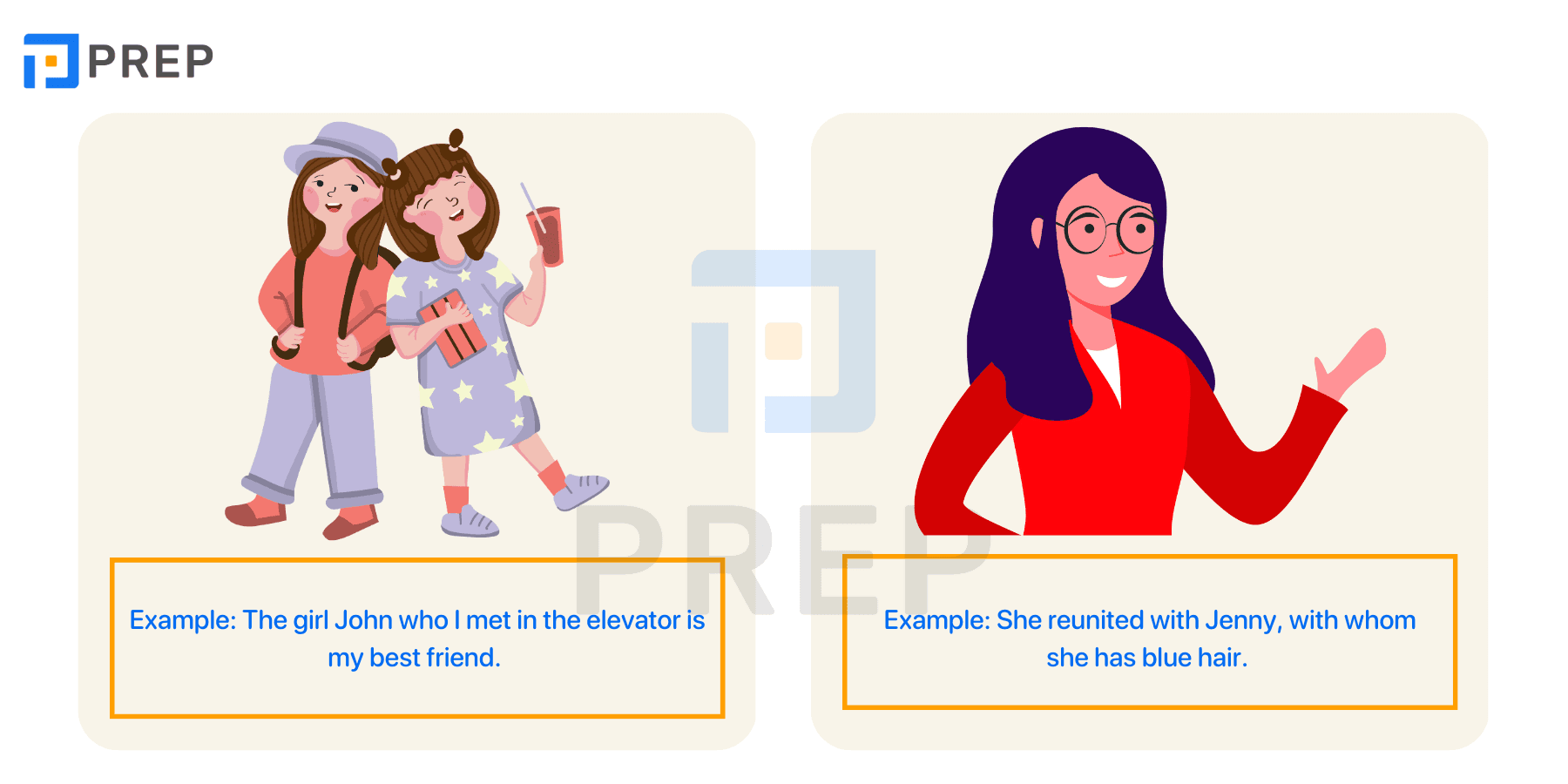Who, Whom, Whose: Definitions, Rules, and Examples
Master the correct use of Who, Whom, and Whose in English with clear explanations, grammar rules, and real-life examples. This guide covers their meanings, key differences, and usage tips for both formal and informal contexts, plus exercises to boost your exam performance.

I. What Do “Who, Whom, Whose” Mean?
Understanding the difference between who, whom, and whose is essential for using English correctly—especially in exams, formal writing, or professional communication.
-
Who is used as the subject of a sentence. It refers to the person doing the action.
Example: Who called you last night?

-
Whom is used as the object of a verb or preposition. It refers to the person receiving the action.
Example: Whom did you invite to the meeting?

-
Whose indicates possession. It shows that something belongs to someone.
Example: Whose phone is ringing?

These words function as both interrogative pronouns (used in questions) and relative pronouns (used to join clauses). Mastering them can significantly improve your accuracy in grammar and your confidence in writing and speaking.
They belong to the group of interrogative pronouns, which also includes ‘what,’ ‘which,’ and ‘when.
1. Differences Between Who, Whom, and Whose
Although “who,” “whom,” and “whose” are related, they serve different grammatical functions. Here's a breakdown of how they differ:
|
Word |
Function |
Role in Sentence |
Example |
|
Who |
Interrogative / Relative |
Subject (does the action) |
Who is coming to the party? |
|
Whom |
Interrogative / Relative |
Object (receives action) |
Whom did you call last night? |
|
Whose |
Interrogative / Relative |
Possessive (shows ownership) |
Whose keys are these on the table? |
Usage Tip:
- In academic writing, adjective clauses often use who/whom/whose to modify nouns.
- In formal English (e.g., academic writing or job applications), using whom correctly can demonstrate good command of grammar.
- In everyday conversation, whom is often replaced by who—saespecially in spoken English—though it’s still considered grammatically informal.
- Whose remains common and correct in both spoken and written contexts.
Mastering the appropriate use of these words will help you communicate more clearly and confidently in various real-life contexts.

2. Grammar Rules for Using Who, Whom, Whose
Understanding the grammatical roles of who, whom, and whose is essential for using them accurately in both writing and speech. Below are the key rules to help you identify and apply each word correctly.
Distinguishing Subject and Object
- Who functions as the subject of a sentence—the person performing the action.
Example: Who sent you this email?
(“Who” is the person doing the action.) - Whom serves as the object of a verb or preposition—the person receiving the action.
Example: Whom did she invite to the meeting?
(“Whom” is the object of the verb “invite.”) - Quick check: Replace with he/she or him/her.
- If he/she fits → use who.
- If it can be replaced with an object pronoun (him/her), it is a sign that whom should be used.
- Example: She invited him → Whom did she invite?
Using Possessive with "Whose"
Whose expresses possession and can be used for both people and things.
Whose + noun + verb...
- Question example: Whose laptop is on the table?
- Relative clause example: The student whose essay won the prize was very proud.
In this case, ‘whose’ acts as one of the relative pronouns that connect clauses smoothly.
Formal vs. Informal Usage
- In formal or academic writing, whom should be used when grammatically required, especially after prepositions.
Example: To whom it may concern. - In informal contexts and everyday speech, who is commonly used in place of whom, and this is generally accepted in modern usage.
Example: Who did you speak to? (instead of Whom did you speak to?) - Whose remains appropriate in both formal and informal styles, and should not be omitted or replaced casually.

3. Synonyms and Alternatives
Although "who," "whom," and "whose" are standard English pronouns with specific grammatical roles, there are alternative expressions—both formal and informal—that can be used in certain contexts. Understanding these alternatives can help you vary your sentence structure and adapt to different tones in writing and speech.
Informal Alternatives
- Who can often be replaced by a name or another subject pronoun in casual conversation.
Example: John is the one who called you → John called you. - Whom is frequently avoided in everyday speech and replaced by who, even when it's grammatically incorrect. This is acceptable in informal settings, though not in exams or formal writing.
Example: Who did you see last night? (Informal, instead of Whom did you see?) - Whose is typically used in both formal and informal situations, but in speech it may be rephrased.
Example: Whose book is this? → Is this your book?
Formal and Academic Substitutes
- To maintain a formal tone or fulfill grammatical precision in writing:
Whom can be embedded in more formal structures such as:
The candidate to whom you spoke has been shortlisted. - In academic or IELTS/TOEFL writing, using relative clauses with prepositions can demonstrate grammatical range and accuracy.
Instead of: The professor who I emailed → use The professor to whom I sent an email. - Whose can sometimes be rewritten using possessive constructions:
Example: The student whose paper was missing → The paper of the student that was missing (though this can sound more awkward or unnatural).
II. Using “Who Whom Whose” in English Exams
When preparing for English exams such as IELTS, TOEFL, or other academic proficiency tests, understanding how to use who, whom, and whose accurately can enhance your grammar score, especially in the writing and speaking sections. Examiners often look for precise structure, appropriate formality, and varied sentence construction.
IELTS Writing and Speaking Tips
In IELTS Writing Task 2, using relative pronouns like whose or properly formed clauses with whom can boost your Lexical Resource and Grammatical Range scores.
- Example: Candidates whose qualifications match the job description should be shortlisted.
- Example: The expert to whom the question was addressed provided a detailed answer.
In the Speaking test, clarity and natural delivery matter more than strict formality.
- It's acceptable to say: Who did you meet yesterday? rather than: Whom did you meet?
- However, demonstrating the ability to use whose and varied structures correctly may still reflect strong language control.
TOEFL and Academic Contexts
In the TOEFL Writing section, particularly the independent task, grammatical precision is essential. Avoid casual misuse of who and demonstrate command of grammar through formal structures.
-
Example of academic tone: The researcher with whom the team collaborated was based in Canada.
In integrated or academic-style writing, whose is preferred for expressing possession: The author, whose findings were widely accepted, introduced a new theory.
Avoid overusing who, especially in long or complex sentences. Vary your sentence structures by incorporating relative clauses carefully and appropriately.
III. Who Whom Whose exercises with answers
Practicing grammar through targeted exercises is one of the most effective ways to master the correct use of who, whom, and whose. Below are a variety of question types designed to help you reinforce your understanding. Answers are provided after each section so you can check your progress.
Exercise 1: Fill in the Blanks
Complete the following sentences with who, whom, or whose.
- The teacher ______ explained the lesson was very patient.
- To ______ did you send the final report?
- I met a man ______ brother is a famous actor.
- ______ called you this morning?
- The candidate ______ resume impressed the panel got the job.
Exercise 2: Sentence Rewriting
Rewrite the sentences below using who, whom, or whose where appropriate.
- I spoke to the manager. The manager was very helpful.
→ _____________________________________________ - She is the woman. Her son won the scholarship.
→ _____________________________________________ - Do you know the person? You saw the person yesterday.
→ _____________________________________________
Exercise 3: Multiple Choice (Choose the correct word)
- ______ do you think will get the promotion?
a) Whom
b) Whose
c) Who - The man ______ wallet was stolen reported it to the police.
a) who
b) whose
c) whom - From ______ did you receive the invitation?
a) whom
b) who
c) whose
Answers
[prep_collapse_expand open_text="View more" close_text="Show less"]
|
Exercise 1 |
Exercise 2 |
Exercise 3 |
|
|
|
[/prep_collapse_expand]
The above information provides the most accurate understanding of how to use Who Whom Whose in English. Correct use of relative pronouns will help you score better in exams and communicate more naturally. Let’s explore more interesting knowledge with PREP!

Hi I'm Chloe, and I am currently serving as an Product Content Administrator at Prep Education. With over five years of experience in independent online IELTS study and exam preparation, I am confident in my ability to support learners in achieving their highest possible scores.
Comment
Premium content
View allPersonalized roadmap
Most read












